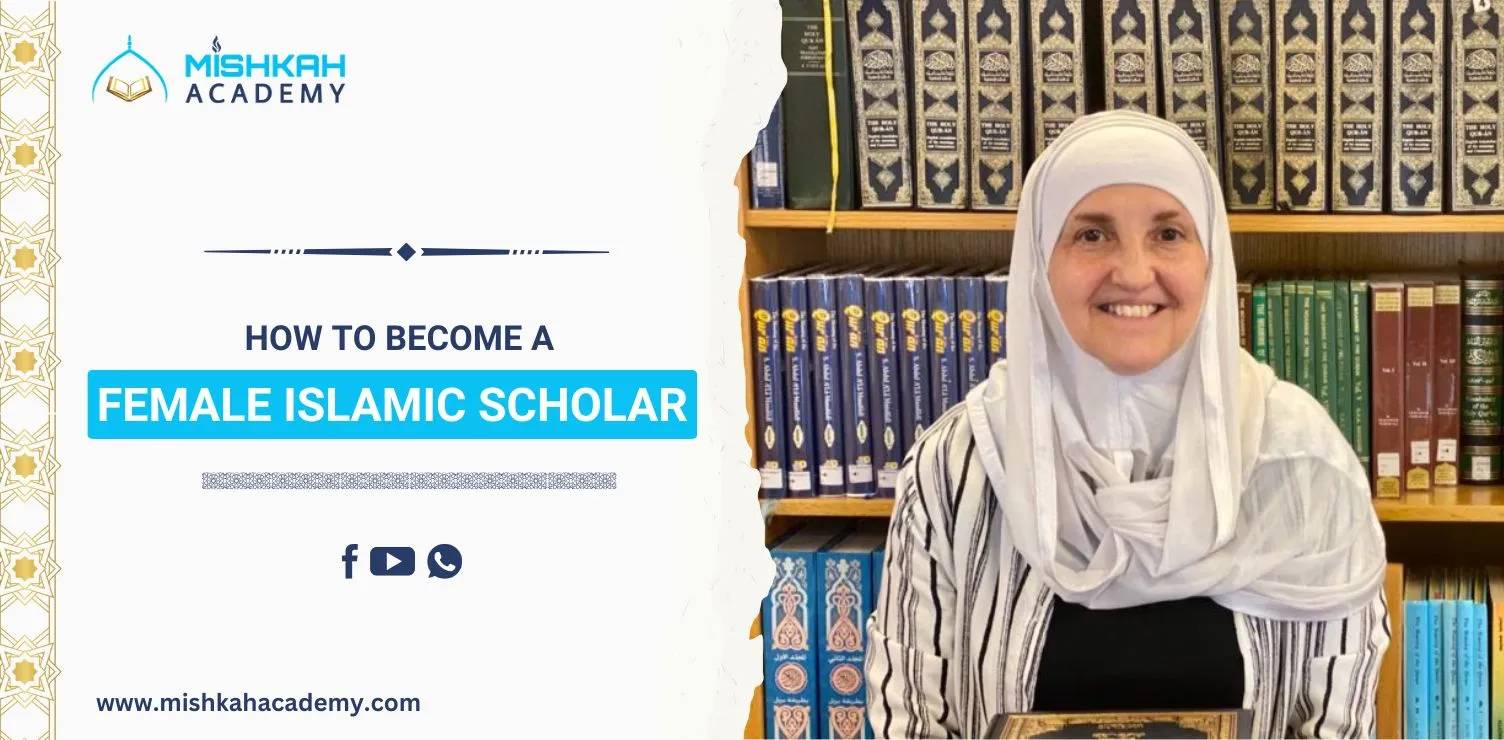Becoming a female scholar, or an Aalimah, in Islam is a noble goal pursued by many. This article outlines ten essential steps to achieve this role, covering key areas of Islamic knowledge. Begin with a study of Islamic history and the roles of women, then master Quranic recitation and memorize key verses. Understanding the Hadith and their validation methods is crucial, as well as studying Fiqh with a focus on women’s jurisprudence in Islamic classes for ladies.
Understand Aqeedah and interpret the Quran with Tafseer. Finally, obtain an Ijazah certificate to become one.
10 Steps to Become a Female Islamic Scholar in Islam
Table of Contents
ToggleThese steps provide a comprehensive path for those dedicated to becoming an Islamic scholar.
1. Study Islamic History and Women’s Roles
Understanding Islamic history, especially the roles women played, is very important for a female scholar. Many women were pivotal in spreading Islam and teaching others. Studying their lives will inspire and guide you. Learn about how they contributed to society, stood up for justice, and supported the Prophet Muhammad (PBUH). These women serve as role models in Islamic knowledge, courage, and faith.
Here’s a table of notable women figures in Islam:
| Woman’s Name | Role in Islam |
| Khadijah bint Khuwaylid | First convert to Islam, a supporter of the Prophet |
| Aisha bint Abu Bakr | Scholar of Hadith, teacher to many companions |
| Fatimah bint Muhammad | Role model for modesty, compassion, and knowledge |
| Asma bint Abu Bakr | Known for bravery and assistance in Hijrah |
| Umm Salamah | Scholar in Hadith and Quran interpretation |
2. Master Quranic Recitation and Tajweed Rules
Mastering Quran recitation with proper Tajweed (rules for pronunciation) is essential to become a Islamic scholar. Reciting with Tajweed not only beautifies the Quran’s words but also helps you connect more deeply with its meaning. When you recite correctly, it strengthens your understanding and allows you to teach others confidently.
Start with a reliable teacher who can guide you through the rules of Tajweed. Practice daily to improve your pronunciation. Focus on each verse, giving attention to every sound. Practicing regularly will improve your fluency, and listening to qualified reciters can also help you learn faster.
3. Memorize and Understand Key Quranic Ayahs
Memorizing important verses of the Quran is necessary for an Aalimah as these verses guide all aspects of life. Understanding these Ayahs allows you to explain them to others and apply them in daily life. These selected Ayahs touch upon vital aspects of faith, morality, and social conduct.
Here are a few essential Ayahs to focus on:
- Ayah on Tawheed (Oneness of Allah): Surah Al-Ikhlas (112:1-4) emphasizes the oneness of Allah.
- Ayah on Patience: Surah Al-Baqarah (2:153) advises patience and prayer.
- Ayah on Knowledge: Surah Al-Mujadila (58:11) highlights the value of knowledge.
4. Learn Hadith Collection and Validation Methods
Learning about Hadith, the sayings of the Prophet Muhammad (PBUH), is a fundamental part of becoming an Islamic scholar. Hadith explains many aspects of Islamic teachings and practices. However, knowing which Hadith are authentic is crucial.
Scholars have developed methods for validating Hadith, which helps ensure the teachings are true and accurate. Begin by studying the major collections, like Sahih Bukhari and Sahih Muslim. Understand the basics of Hadith science, including the chain of narrators (Isnad) and the text of the Hadith (Matn).
5. Study Fiqh Principles and Women’s Jurisprudence
Fiqh, or Islamic law, covers many aspects of daily life, including worship, family matters, and personal conduct. Understanding Fiqh principles helps a scholar apply Islamic teachings to real-life situations. Women’s jurisprudence focuses on rules specific to women, such as issues related to family, modesty, and personal obligations.
Key topics for women include:
- Menstruation and purification rules
- Marriage, divorce, and inheritance laws
- Modesty guidelines and dress code
- Rights and duties in family and society
Studying Fiqh with a focus on women’s issues helps you understand your rights, duties, and how to practice Islam correctly.
Note: By enrolling in “Online Islmaic Course” with certified Islamic scholars ladies can learn and understand Islamic properoly.
Start Your Becoming Scholar Journey Now6. Deepen Knowledge in Aqeedah (Islamic Creed)
Aqeedah, or Islamic creed, is the foundation of faith in Islam. It covers beliefs about Allah, the prophets, the afterlife, and other core concepts. Understanding Aqeedah strengthens your faith, helps answer common questions, and clears up doubts. This knowledge is essential for any scholar, as it builds a strong connection to Allah and clarifies what every Muslim must believe.
To start, learn about Tawheed (the oneness of Allah), the attributes of Allah, and the importance of following the prophets. Work with a qualified teacher and read trusted books on Aqeedah.
7. Interpret the Quran with Tafseer and Context
Understanding the Quran through Tafseer (interpretation) is crucial, especially for women. Tafseer explains the meaning of verses, their background, and how they apply to different situations. As a female scholar, this is particularly valuable for understanding verses related to women’s rights, roles, and responsibilities. Tafseer provides clarity and helps avoid misunderstandings.
To study Tafseer, start with trusted sources and knowledgeable teachers. Look at the historical and social context of each verse. Reflect on how these interpretations apply to modern life and women’s experiences. Moreover, it is better to enroll in quran tafseer course to deeper knowledge and understanding.
8. Analyze Sunnah and Prophet’s Practices
The Sunnah, or practices of Prophet Muhammad (PBUH), is a vital part of Islamic teachings. The Prophet’s actions show how to apply Islamic principles in everyday life, from worship to family interactions. For a female scholar, studying the Sunnah helps in understanding the Prophet’s kindness, respect for women, and guidance on various aspects of life.
To learn the Sunnah, focus on authentic Hadith collections and study how the Prophet treated women, managed family life, and showed patience and compassion. Practice these teachings in your own life to grow spiritually.
9. Differentiate Myths from the Actual Truth in Islam
Clearing up these misconceptions helps present the true message of Islam and prevents confusion. As a scholar, you’ll be able to educate others and dispel myths that often arise.
Here’s a table with some common myths and their actual truths:
| Myth | Actual Truth |
| Women cannot seek knowledge | Islam encourages knowledge for both men and women equally |
| Hijab is forced upon women | Hijab is a personal act of worship and choice |
| Women cannot participate in public life | Women can participate while observing Islamic guidelines |
| Men have full control over women | Islam gives women rights in marriage, finances, and education |
| Islam allows forced marriage | Islam requires mutual consent for marriage |
To learn how to differentiate myths from truth, study authentic Islamic sources and discuss these topics with knowledgeable scholars.
10. Obtain Ijazah Certification to Become a Qualified Female Scholar
Ijazah is a formal certification that acknowledges your deep knowledge of specific Islamic studies, such as Quran, Hadith, or Fiqh. Obtaining Quran Ijazah not only shows your dedication and expertise but also qualifies you to teach others. It’s the final step in becoming a recognized scholar, as it connects you to a chain of teachers going back to the Prophet Muhammad (PBUH).
To get an Ijazah, find a certified scholar or institution that offers this training. Complete the required studies and demonstrate your knowledge through assessments or discussions.
Can a Woman be an Islamic Scholar?
Yes, a woman can be an Islamic scholar. In Islamic tradition, a female scholar is known as an ʿālimah or Shaykha. Historically and today, women have contributed significantly to Islamic knowledge.
With increased access to education and universities, many women now pursue advanced studies in Islamic sciences, teaching and guiding others. Islam encourages both men and women to seek knowledge, making it fully permissible for women to become respected scholars in fields like Quran, Hadith, and Fiqh.
Can a Girl Become Mufti in Islam?
Yes, a woman can become a Mufti in Islam. While women traditionally weren’t public religious leaders, Islamic history shows no restrictions against women taking scholarly roles.
Many female scholars, jurists, and spiritual guides have provided religious guidance over the centuries. Becoming a Mufti involves extensive training in Islamic jurisprudence, and dedicated women can pursue this path.
Conclusion
Women pursuing roles as Islamic scholars, teachers, and even Muftis is both possible and supported within Islamic tradition. With the right knowledge and training, women can serve as respected authorities in various Islamic sciences, guiding and educating others.
Mishkah Academy is a pioneer in this field, offering expert guidance from experienced female quran tutors who have been teaching Islamic, memorization, and tajweed, and quran classes for sisters for years.
Start Your Becoming Scholar Journey Now





